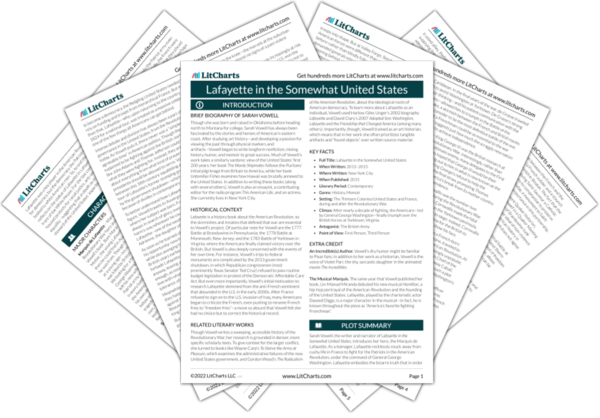Redcoats Quotes in Lafayette in the Somewhat United States
The place looks wrong. I’m not bothered that the present intrudes on the past, what would the combination Pizza Hut-Taco Bell looming near a road once crammed with redcoats; or that Fuzzy Butts Dog Daycare is situated a stone’s throw from the old Quaker house where Lafayette reportedly spent the night before the battle. No, my problem is springtime. The Brandywine countryside is in bloom—too green, too chirpy, too full of life.

Unlock explanations and citation info for this and every other Lafayette in the Somewhat United States quote.
Plus so much more...
Get LitCharts A+When Lafayette wrote his letter to Washington worrying that America could lose the war not at the hands of the redcoats but rather “by herself and her own sons,” he might not have been referring solely to the Conway cabal. He may have also had in mind the observable fact that the military, congressional, and state bureaucracies responsible for supplying the common soldiers with luxuries like food, water, and shoes word, to use an acronym coined by the grunts of Ike’s war, FUBAR.
Anyone who accepts the patriot’s premise that all men are created equal must come to terms with the fact that the most obvious threat to equality in eighteenth-century North America was not taxation without representation but slavery. Parliament would abolish slavery in the British Empire in 1833, thirty years before President Lincoln’s Emancipation Proclamation. A return to the British fold in 1778 might have freed American slaves three decades sooner, which is what, an entire generation and a half? Was independence for some of us more valuable than freedom for all of us? As the former slave Frederick Douglass put it in an Independence Day speech in 1852, “This is your 4th of July, not mine.”
The Americans, who had been British for centuries and not British for only three years, were quick to turn on the French after Newport—too quick. Most of that ire can be explained by the current events in Rhode Island, but some of the patriot disdain was older, in their blood.
For that reason, some scholars consider this somewhat forgotten maritime dust up—referred to as the Battle of the Chesapeake […]—to be the most important altercation of the American Revolution, a take that’s all the more astonishing considering not a single American took part in it. Nor did a single American even witness it.












